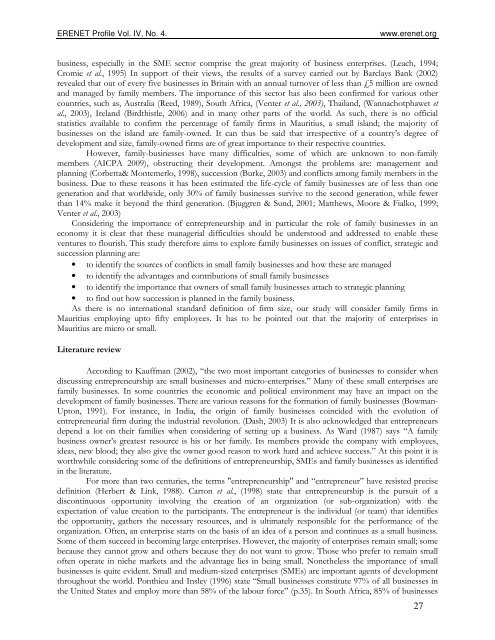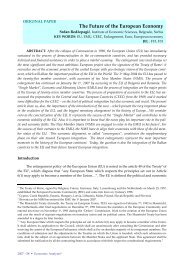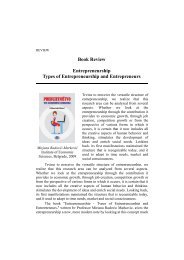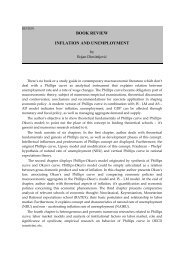Issue 16
Issue 16
Issue 16
You also want an ePaper? Increase the reach of your titles
YUMPU automatically turns print PDFs into web optimized ePapers that Google loves.
ERENET Profile Vol. IV, No. 4.<br />
www.erenet.org<br />
business, especially in the SME sector comprise the great majority of business enterprises. (Leach, 1994;<br />
Cromie et al., 1995) In support of their views, the results of a survey carried out by Barclays Bank (2002)<br />
revealed that out of every five businesses in Britain with an annual turnover of less than £5 million are owned<br />
and managed by family members. The importance of this sector has also been confirmed for various other<br />
countries, such as, Australia (Reed, 1989), South Africa, (Venter et al., 2003), Thailand, (Wannachotphawet et<br />
al., 2003), Ireland (Birdthistle, 2006) and in many other parts of the world. As such, there is no official<br />
statistics available to confirm the percentage of family firms in Mauritius, a small island; the majority of<br />
businesses on the island are family-owned. It can thus be said that irrespective of a country’s degree of<br />
development and size, family-owned firms are of great importance to their respective countries.<br />
However, family-businesses have many difficulties, some of which are unknown to non-family<br />
members (AICPA 2009), obstructing their development. Amongst the problems are: management and<br />
planning (Corbetta& Montemerlo, 1998), succession (Burke, 2003) and conflicts among family members in the<br />
business. Due to these reasons it has been estimated the life-cycle of family businesses are of less than one<br />
generation and that worldwide, only 30% of family businesses survive to the second generation, while fewer<br />
than 14% make it beyond the third generation. (Bjuggren & Sund, 2001; Matthews, Moore & Fialko, 1999;<br />
Venter et al., 2003)<br />
Considering the importance of entrepreneurship and in particular the role of family businesses in an<br />
economy it is clear that these managerial difficulties should be understood and addressed to enable these<br />
ventures to flourish. This study therefore aims to explore family businesses on issues of conflict, strategic and<br />
succession planning are:<br />
• to identify the sources of conflicts in small family businesses and how these are managed<br />
• to identify the advantages and contributions of small family businesses<br />
• to identify the importance that owners of small family businesses attach to strategic planning<br />
• to find out how succession is planned in the family business.<br />
As there is no international standard definition of firm size, our study will consider family firms in<br />
Mauritius employing upto fifty employees. It has to be pointed out that the majority of enterprises in<br />
Mauritius are micro or small.<br />
Literature review<br />
According to Kauffman (2002), “the two most important categories of businesses to consider when<br />
discussing entrepreneurship are small businesses and micro-enterprises.” Many of these small enterprises are<br />
family businesses. In some countries the economic and political environment may have an impact on the<br />
development of family businesses. There are various reasons for the formation of family businesses (Bowman-<br />
Upton, 1991). For instance, in India, the origin of family businesses coincided with the evolution of<br />
entrepreneurial firm during the industrial revolution. (Dash, 2003) It is also acknowledged that entrepreneurs<br />
depend a lot on their families when considering of setting up a business. As Ward (1987) says “A family<br />
business owner’s greatest resource is his or her family. Its members provide the company with employees,<br />
ideas, new blood; they also give the owner good reason to work hard and achieve success.” At this point it is<br />
worthwhile considering some of the definitions of entrepreneurship, SMEs and family businesses as identified<br />
in the literature.<br />
For more than two centuries, the terms "entrepreneurship" and “entrepreneur” have resisted precise<br />
definition (Herbert & Link, 1988). Carton et al., (1998) state that entrepreneurship is the pursuit of a<br />
discontinuous opportunity involving the creation of an organization (or sub-organization) with the<br />
expectation of value creation to the participants. The entrepreneur is the individual (or team) that identifies<br />
the opportunity, gathers the necessary resources, and is ultimately responsible for the performance of the<br />
organization. Often, an enterprise starts on the basis of an idea of a person and continues as a small business.<br />
Some of them succeed in becoming large enterprises. However, the majority of enterprises remain small; some<br />
because they cannot grow and others because they do not want to grow. Those who prefer to remain small<br />
often operate in niche markets and the advantage lies in being small. Nonetheless the importance of small<br />
businesses is quite evident. Small and medium-sized enterprises (SMEs) are important agents of development<br />
throughout the world. Ponthieu and Insley (1996) state “Small businesses constitute 97% of all businesses in<br />
the United States and employ more than 58% of the labour force” (p.35). In South Africa, 85% of businesses<br />
27
















